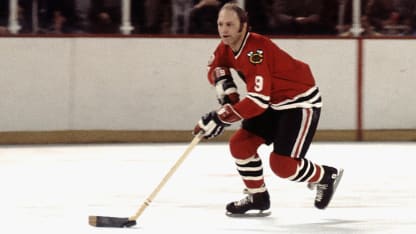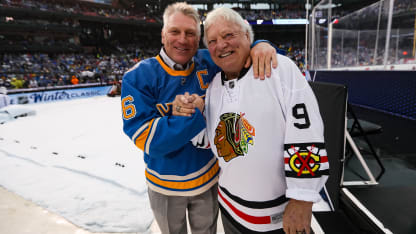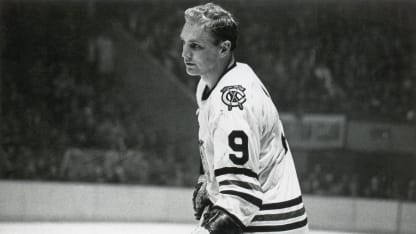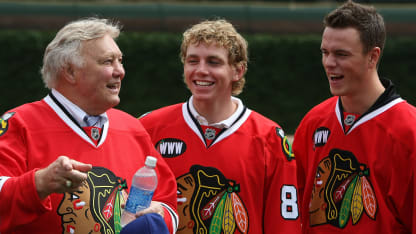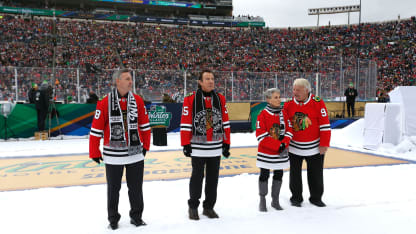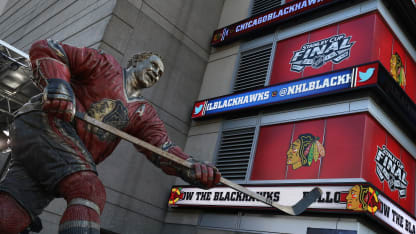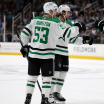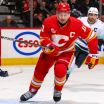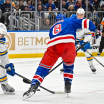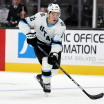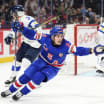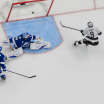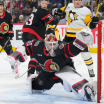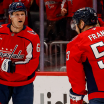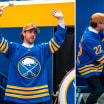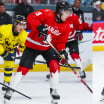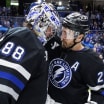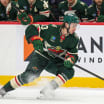Hull continued to fill the net for the rest of the 1960s. In 1961-62, he joined
Maurice Richard
and
Bernie Geoffrion
as the only players to score 50 goals in a season. He set a single-season NHL record of 54 in 1965-66, the first of four consecutive seasons when he led the NHL in goals. That stretch was capped by a record-setting 58-goal performance in 1968-69.
"Whenever we played against Chicago, Claude Provost was assigned by (coach) Toe Blake to cover him," former Montreal Canadiens captain Yvan Cournoyer said Monday. "He was Bobby's shadow. Bobby knew it but he was respectful of what Claude's job was. He never did anything to Claude, they never fought, they just played their game.
"Bobby and I were good friends. When I owned a restaurant years ago, he'd come almost every year to my fundraising golf tournament. He was a big ticket throughout the NHL. I played against his teams but whenever he was on the ice, it was Provost, a right wing, against Bobby. I sat on the bench and watched. He was a huge part of his Blackhawks teams."
Though Hull dropped from 58 goals to 38, Chicago finished first in the East in 1969-70 but were swept by the Boston Bruins in the NHL Semifinals. The Black Hawks moved to the West Division the following season, putting them with the six teams that had joined the NHL in the 1967 expansion, and won three straight division titles.
Hull had 44 goals in 1970-71 and helped the Black Hawks reach Game 7 of the Stanley Cup Final, where they lost to the Canadiens. He scored 50 goals for the fifth time in his career in 1971-72, but Chicago was swept in four games by the Rangers in the NHL Semifinals.
By the summer of 1972, the 50-goal mark had been reached 11 times in NHL history; Hull accounted for five of them.
"Bobby dominated the offensive game with Chicago, they had a great offense with Stan Mikita on another line," said Frank Mahovlich, who won the Stanley Cup four times with the Toronto Maple Leafs and twice with the Canadiens. "They were tough to play against. Bobby was a great skater, powerful, very strong, and boy, it was exciting to watch him play all those games and score all those goals.
"But it's amazing, as I think about it, that I won the Stanley Cup three times in Chicago (1962 with Toronto and 1971 and 1973 with Montreal) and Bobby never won it on home ice (Chicago won the 1961 championship in Detroit)."
RELATED: [Hull 'galvanized' NHL with giant shot, skill with Blackhawks]
Mahovlich remembered the hugely curved sticks used by Hull and Mikita that terrorized opposing goalies.
"I was amazed that Bobby and Stan were allowed to do what they did with their sticks," he said. "It's almost like they were playing with lacrosse sticks, it was very difficult to get the puck away from them. Their shots were much harder, the puck would spin a lot more. Some of the shots that he and Stan let go, it was tough on the goalies."
At 33, Hull had scored 604 NHL goals and appeared to be in line to break
Gordie Howe
's all-time record at the time of 786. But that all changed in the summer of 1972, when Hull stunned the hockey world by signing a 10-year contract with the Winnipeg Jets of the new World Hockey Association.
Hull was just as dangerous in the WHA. He scored 51 and 53 goals in his first two seasons, then played left wing on a line with Swedish forwards Ulf Nilsson and Anders Hedberg in 1974-75 and finished with 77 goals in 78 games.
Four WHA teams, including the Jets, joined the NHL in 1979-80, bringing Hull back to the League for two final seasons. He had 17 points (six goals, 11 assists) in 27 games with the Jets and Hartford Whalers (where he and Howe were teammates).
Hull sat out the 1980-81 season and went to training camp with the Rangers in the fall of 1981, but retired for good after playing five preseason games. He finished his NHL career with 610 goals and 1,170 points in 1,063 games, and 62 goals and 129 points in 119 playoff games. He won the
Art Ross Trophy
as the leading scorer in the NHL three times (1959-60, 1961-62, 1965-66), the
Hart Trophy
as most valuable player twice (1964-65, 1965-66) and the
Lady Byng Trophy
for gentlemanly play once (1964-65).
Hull's No. 9 was retired by the Blackhawks in 1983, the same year he was inducted into the Hockey Hall of Fame, but his relationship with the organization was cool for many years. It warmed Dec. 19, 2007, when then-team president John McDonough brought Hull and longtime teammate
Stan Mikita
back as ambassadors.
"I'm overwhelmed to be part of the Chicago Blackhawks family again," Hull said at the time. "I've been away from Chicago for some 35 years, but Chicago was never out of my heart. It is truly time for me to come back to Chicago."
